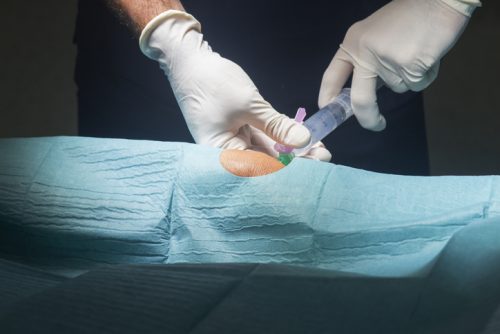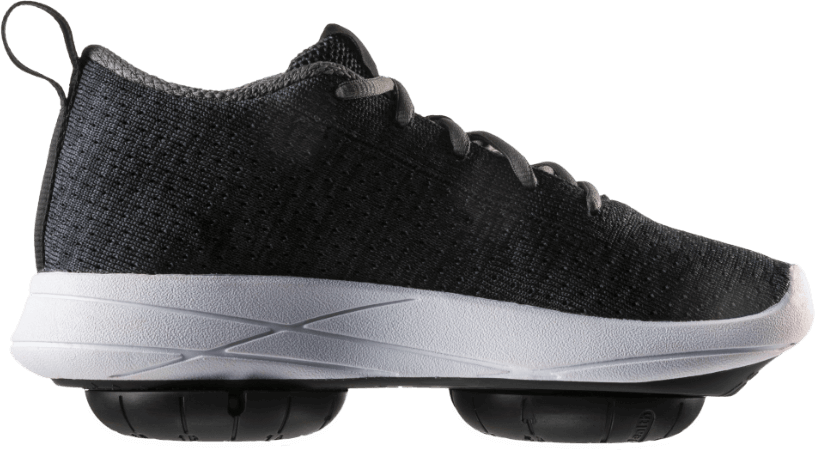Getting hyaluronic acid injections in the knee is a popular way to ease knee pain.
By employing one of the body’s naturally-occurring lubricants, hyaluronan, hyaluronic acid injections are designed to lubricate the knee joints and buffer the “wear and tear” of knee osteoarthritis.
We’ve taken a look into this treatment method to see precisely what it is, how it works, and if it’s effective.
What are Hyaluronic Acid Injections?
These injections contain a hyaluronic acid solution that aims to replace missing joint lubricants.
As you can imagine, the injection takes place on the knee, sending the solution directly into the problem area. The theory is that this lubricates the joint and helps reduce stiffness—one of the key symptoms of knee arthritis.
How Do the Injections Work?

To understand how hyaluronic injections work, we need to consider the way the knee joint works.
Healthy knee joints include hyaluronan. This fluid naturally occurs in the body and is meant to lubricate the joint. The lubricating effect of hyaluronan makes it possible to move the knee through different ranges of motion with little to no resistance.
Unfortunately, if you suffer from arthritis, then this fluid comes in short supply. The knee doesn’t receive ample lubrication, which causes excessive stiffness.
As a result, there’s more friction inside the joint. When the knee moves, things rub against one another, which can create pain and inflammation.
Therefore, an injection of hyaluronic acid will bring more lubrication to the joint. Consequently, this is supposed to present the following benefits:
- Lubrication
- Reduction of inflammation
- Reduction of pain
A 2015 study showed that hyaluronic acid injections reduced inflammation in patients and inhibited pain signals being sent to the brain. As a result, pain relief was experienced, as was a reduction in swelling.
Numerous studies, including one in 2016, have shown that hyaluronic acid injection can provide better lubrication to the knee joint. This reduces friction and prevents excessive stiffness. The secondary effect of this is that it can also prevent the loss of cartilage and bone – which happens over time when there’s too much friction in the knee joint.
In essence, this treatment method mainly works by targeting one of the key symptoms and issues with arthritis – the lack of lubrication. By restoring this to the knee, it can get rid of some of the problems sufferers face.
Do They Relieve Pain?
As detailed above, there is a considerable amount of evidence to suggest that this treatment works.
However, although hyaluronic acid injections may provide relief from chronic knee pain, it isn’t a long-term treatment solution. We must remember that there is no cure for osteoarthritis. Most reports suggest that the relief can last anywhere between six months to a year.
Another consideration is that hyaluronic acid injections aren’t fast-acting. Typically, multiple shots are required before one sees the desired results.
Primarily, the main issue with this treatment is that it only masks the symptoms of arthritis. Additionally, as with other treatments, some patients will experience no effect at all.
In conclusion, do these injections work? Yes, they provide pain relief for a limited amount of time. However, they do not address the core biomechanical problems related to knee pain.
What are the Risks/Side Effects?
Whenever you inject anything into the body, there will be a risk of infection. This usually happens when the needle isn’t correctly sterilized, or the person performing the procedure isn’t experienced and makes a mistake. The material being injected is not to blame here, though.
You may experience some minor to moderate pain and swelling after the first few injections. There could also be a build-up of fluid but this can be dealt with by resting the joint and applying a cold compress. This is the most common side effect and will go away after a few treatments.
Other side effects could include:
- Vascular occlusion
- Cellulitis
- Abscess
- Itching
Alternative Treatment Options for Arthritic Knees

As we’ve already mentioned, some people opt for other knee injection treatments to provide pain and stiffness relief. This includes corticosteroid injections, along with other gel injections.
Some people, of course, find relief by having knee replacement surgery. But, this isn’t ideal for everyone and can cause complications.
For those who can’t have knee replacement surgery or simply see it as a last resort, there are a few other alternative treatment options. If you would like to learn more about the newest alternative treatment options for knee pain and the clinical research behind these treatments, click here.
Other treatments for knee arthritis include:
- Biomechanical therapy (Apos®)
- Medications (OTC or Rx)
- Physical therapy and exercise
- Hot/cold packs
Hopefully, this article has shined a light on hyaluronic acid injections and you are more informed about this particular treatment option. We suggest that you do plenty of research before choosing a treatment option for your knee pain.


